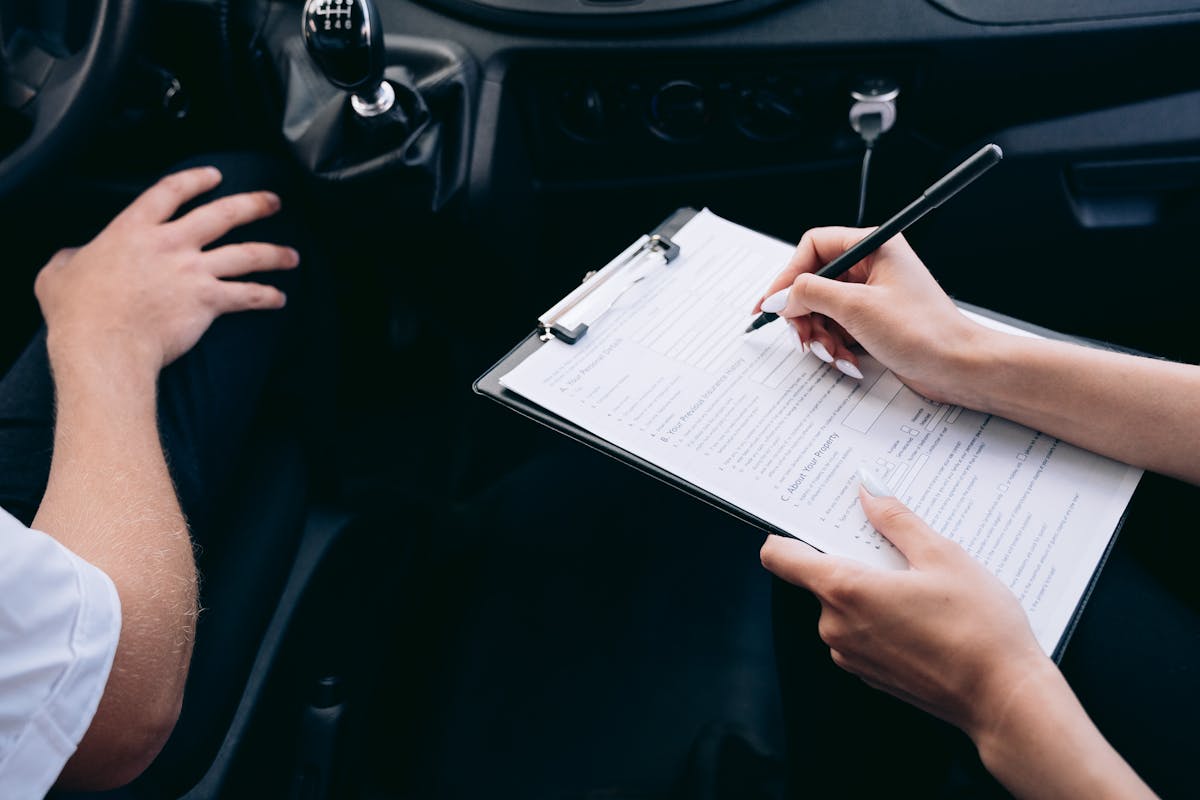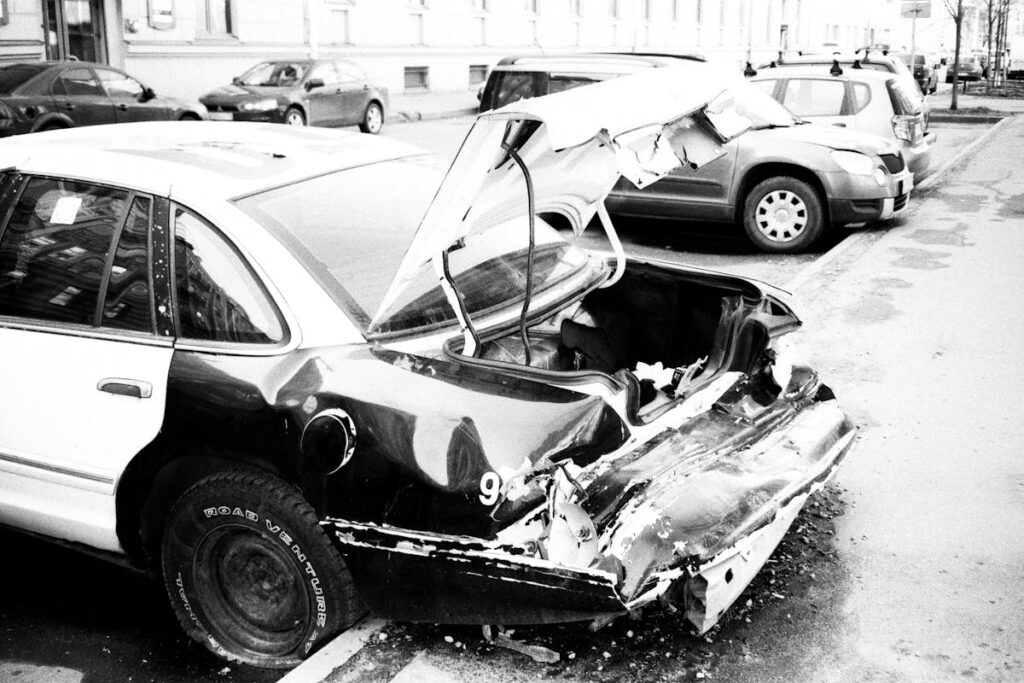The aftermath of a car accident can be a chaotic and stressful experience, particularly when the other party involved hails from out-of-state. The intricacies of dealing with different insurance rules, state laws, and potential legal implications can seem intimidating. Therefore, knowing how to handle such a situation in California becomes essential. In this situation, we shall discuss the vital steps to follow, the importance of understanding California’s specific insurance laws and when you might consider involving a local accident attorney for seamless resolution.
Understanding Out-of-State Car Accidents
While it may seem confusing at first, understanding how to handle out-of-state car accidents in California is vital for any driver. The complex interplay of out-of-state regulations and California law can influence accident liability, potentially affecting financial responsibility for damages. California law applies to all accidents within its borders, regardless of the drivers’ home states. As a result, any driver, California resident or not, must adhere to these laws when involved in an accident. This includes the legal requirement to stop, exchange information, and report the accident. However, out-of-state drivers may also be subject to their home state’s insurance laws, which can complicate matters. Understanding these regulations is significant in managing accident liability and ensuring a fair outcome in the aftermath of a collision.
Importance of Gathering Evidence
As we navigate the complexities of handling out-of-state car accidents in California, it becomes apparent that every detail can have a considerable impact on the outcome of the situation. This is why the process of evidence collection cannot be taken lightly. Gathering thorough evidence is pivotal in establishing the sequence of events, determining liability, and supporting your claim. This includes photographs of the accident scene, vehicle damage, road conditions, and any visible injuries. Additionally, eyewitness statements serve as invaluable sources of impartial information, offering perspectives that might otherwise be overlooked. In the face of an out-of-state accident, the careful collection of such evidence could greatly strengthen your case, ensuring an accurate and fair resolution.
Reporting the Incident to Police
Given the essential role that official records play in out-of-state car accidents, reporting the incident to the police immediately becomes a fundamental step.
- Contact the police immediately: After ensuring everyone’s safety, dial 911 to report the accident. Provide accurate, detailed information. A police report is a significant piece of accident documentation that provides a factual, third-party account of the incident.
- Cooperate fully: When the police arrive, cooperate fully. Provide all requested information and follow their instructions. Remember, anything you say can be included in the police report.
- Obtain a copy of the police report: Always request a copy of the police report for your records. It will be essential when dealing with insurance companies or if a legal dispute arises.
Notifying Your Insurance Company
Following the completion of the police report, it is vital to promptly notify your insurance company about the accident. This step, known as accident reporting, is fundamental to initiate your claim and protect your rights. When notifying insurance, provide them with all relevant details, including the date, time, and location of the accident, as well as any damages or injuries incurred. Include any information about the out-of-state driver and their insurance company, if available. Remember to remain truthful and detailed in your report. The insurance company will use this information to assess your claim. Prompt and thorough notification can guarantee that your claim is processed efficiently and accurately, safeguarding you from unnecessary complications.
Understanding California’s Insurance Laws
In order to navigate the aftermath of a car accident in California effectively, a thorough understanding of the state’s insurance laws is necessary. We will examine California’s Auto Insurance Requirements, the interpretation of “Fault” within the state’s legal context, and how non-resident coverage can impact the process. These elements, when thoroughly understood, can considerably streamline your interactions with insurance providers following an accident.
California’s Auto Insurance Requirements
Maneuvering through the maze of California’s Auto Insurance Requirements can be intimidating, yet it’s essential for every driver in the state. California law requires drivers to carry at least the following minimum coverage:
- $15,000 for injury or death to one person.
- $30,000 for injury or death to more than one person.
- $5,000 for damage to property.
These are the policy limits that set the least amount of coverage you must have. However, taking into account the high cost of medical care and the significant damage that can occur in an accident, you may want to contemplate purchasing more than the minimum coverage. Compliance with these laws guarantees protection for yourself and other parties in the event of a collision.
Interpreting “Fault” in California
Deciphering the concept of “fault” in the domain of California’s auto insurance laws is an important step for every driver. The state operates under a system of “comparative negligence,” which fundamentally allows for fault to be shared in an accident. Fault determination is not a binary process; it involves analyzing the actions of each driver involved. It’s not uncommon for multiple parties to share some level of responsibility. In such cases, the comparative negligence system assigns a percentage of fault to each driver. This percentage then influences the amount of damages a party can recover. Understanding this concept can help drivers navigate the complexities of car accidents with out-of-state drivers within California’s jurisdiction.
Dealing With Non-Resident Coverage
Despite the complexities of car insurance laws, it is essential for drivers to understand the nuances of non-resident coverage in California. Non-resident insurance is a vital aspect of car insurance policies that can greatly impact claim outcomes.
- Non-Resident Insurance: This type of insurance is required for out-of-state drivers involved in a California accident. It guarantees that the non-resident driver is financially responsible.
- Coverage Limits: California law mandates minimum coverage limits for non-resident insurance. These limits provide a financial safety net for accident victims.
- Claim Process: Victims can file claims against a non-resident driver’s insurance. However, they should be aware that the process may involve some additional steps compared to typical in-state claims.
Being well-informed about these aspects aids in ensuring a smooth claim process.
Dealing With the Other Driver’s Insurance
Addressing the other driver’s insurance is an important aspect of managing a car accident in California. First, a clear comprehension of their insurance policy, including coverage limits and terms, is essential. We will then explore the claim filing process, detailing the necessary steps to efficiently progress your claim.

Understanding Insurance Policies
How does one navigate the complex world of insurance policies, particularly when dealing with another driver’s insurance after a car accident in California? To begin, it’s essential to understand the types of insurance policies:
- Liability coverage: This insurance policy type covers the costs of damage you cause to others in an accident. It’s mandatory in most states, including California.
- Collision coverage: This helps cover the cost of repairing or replacing your car if it’s damaged in an accident.
- Comprehensive coverage: This insurance policy type pays for damage to your car caused by events other than a collision, like theft or natural disasters.
Understanding these policy types and their respective coverage limits can greatly influence the outcome of your claim, ensuring you receive fair compensation.
Claim Filing Process
In the aftermath of a car accident in California, initiating the claim filing process with the other driver’s insurance can be a challenging task. It starts with understanding different claim types including property damage, bodily injury, and uninsured or underinsured motorist claims. This knowledge is instrumental in accurately detailing the losses sustained. Next, one must be aware of claim deadlines. In California, the statute of limitations for personal injury claims is two years from the date of the accident. For property damage, it’s three years. Missing these deadlines can result in a denial of your claim. It’s advisable to start the claim process as soon as possible to avoid complications and guarantee a smoother resolution.
Hiring a Local Accident Attorney
Maneuvering the aftermath of a car accident can often be an intimidating task, particularly when dealing with an out-of-state driver in California. Hiring a local accident attorney is an essential step to navigate this complex situation effectively.
- Local legal representation: Attorneys well-versed in California’s traffic laws will provide an edge in your case. They are familiar with the local court system and its procedures, ensuring you are accurately represented.
- Attorney fee structures: Most accident attorneys operate on a contingency basis; meaning, their fees are a percentage of the settlement or verdict. Understanding this is important when hiring an attorney.
- Experience: The attorney’s experience in handling similar cases can greatly influence the outcome of your case. Consequently, consider their track record before making a decision.
Pursuing Compensation for Damages
Once you’ve secured legal representation, the next step involves taking action to receive compensation for damages incurred in the accident. In California, victims have several compensation options, which include recovery for medical expenses, lost wages, and property damages. You may also be entitled to compensation for pain and suffering. Understanding your legal rights is essential in determining the compensation you’re entitled to.
Your attorney will help you calculate a fair estimate of your damages and negotiate with the other driver’s insurance company. In cases where an agreement cannot be reached, a lawsuit may be pursued. Remember, proper valuation of your claim is paramount, as it directly impacts the compensation you may receive.
Managing Long-Term Impact and Recovery
While the immediate aftermath of a car accident can be intimidating, dealing with the long-term impact and recovery can be an equally challenging process.
- Medical Care: The first step in managing long-term effects is to guarantee that you receive proper medical treatment. Follow-up visits and rehabilitation are key elements of recovery strategies.
- Legal Assistance: It’s vital to engage an experienced attorney who can help navigate the complexities of a case involving an out-of-state driver.
- Documenting Impact: To facilitate compensation claims, meticulous documentation of the accident’s effects on your life is significant.
Frequently Asked Questions
How Does a Different Time Zone Affect Communication With an Out-Of-State Driver?
Time zone differences can create challenges in communication with an out-of-state driver. Effective strategies include understanding their local time, scheduling calls appropriately, and utilizing asynchronous forms of communication such as emails or text messages when necessary.
What if the Other Drivers Insurance Company Is Not Licensed in California?
If the other driver’s insurance company is not licensed in California, it may complicate the claim process. However, most insurance policies provide nationwide coverage, ensuring claims are handled regardless of the accident’s location.
Can I File a Lawsuit in California Against an Out-Of-State Driver?
Yes, you can file a lawsuit in California against an out-of-state driver. However, jurisdiction issues may arise, and specific lawsuit requirements must be met according to California’s state laws and civil procedure rules.
Are There Different Procedures for Renting a Replacement Vehicle After an Accident?
Yes, rental policies may vary depending on the insurance coverage. Some policies cover rental costs after an accident, while others may not. It’s essential to understand your coverage details prior to renting a replacement vehicle.
What if the Other Driver Refuses to Share Their Insurance Information?
If a driver refuses to share insurance information post-accident, it’s a breach of legal obligations. Report the incident to your insurer immediately and consider involving law enforcement to guarantee proper insurance claims procedures are followed.

